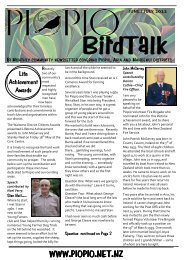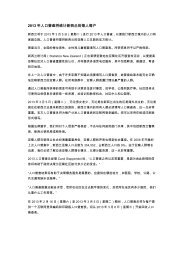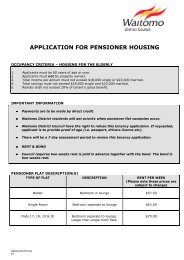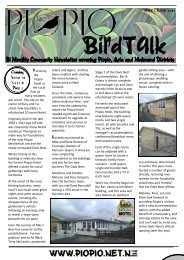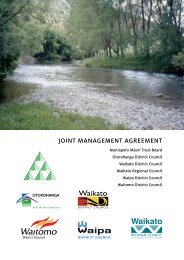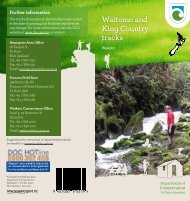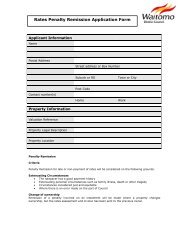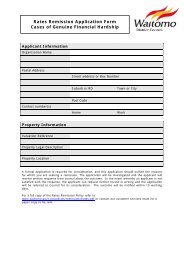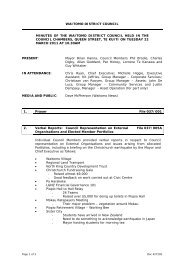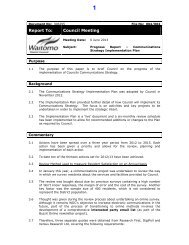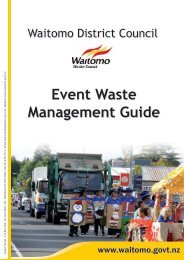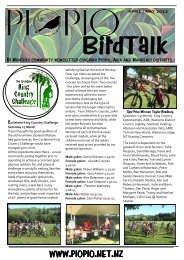Brochure 1 - Waitomo District Council
Brochure 1 - Waitomo District Council
Brochure 1 - Waitomo District Council
Create successful ePaper yourself
Turn your PDF publications into a flip-book with our unique Google optimized e-Paper software.
A Guide to Trade Waste in the Motor Vehicle Industry<br />
<strong>Waitomo</strong> <strong>District</strong> <strong>Council</strong> manages the<br />
wastewater system so that liquid waste<br />
from residential, commercial and industrial<br />
premises can be safely transported,<br />
treated and disposed of.<br />
Trade Waste is defined as any liquid that is<br />
discharged to the wastewater system from<br />
commercial, industrial, manufacturing<br />
or trade premises resulting from any<br />
process or operations. This may include<br />
condensing or cooling waters, stormwater<br />
which cannot be practically separated or<br />
domestic sewage.<br />
Although the amount of waste from any single motor<br />
vehicle business may be relatively small, the effect of<br />
the total amount of waste being discharged from the<br />
motor vehicle industry is very significant.<br />
Pre-treatment<br />
The main types of pre-treatment used in dealing with<br />
oily waste are oil and grit interceptors, dry basket<br />
arrestors, diversion valves, bunding and roofing of<br />
wash areas. Wastewater from toilets, showers and<br />
other processes that generate Trade Waste must not<br />
be directed through the pre-treatment equipment.<br />
All pre-treatment equipment must be approved by<br />
the <strong>Waitomo</strong> <strong>District</strong> <strong>Council</strong> prior to being installed<br />
and must also be installed in accordance with the<br />
standards set out in the New Zealand Building Code.<br />
Managing Oily Trade Waste<br />
Our People, Our Place, Our Future<br />
Motor vehicle businesses within the<br />
<strong>Waitomo</strong> <strong>District</strong> produce harmful liquid<br />
waste pollutants such as petroleum,<br />
hydrocarbons, flammable substances,<br />
metals from engine parts and batteries,<br />
chlorinated solvents, phenols, oils and<br />
solids.<br />
These substances are produced every<br />
day simply by carrying out normal<br />
operations. If that waste is discharged<br />
directly into our wastewater system it<br />
can affect the health of people working<br />
in the wastewater system, damage the<br />
pipes and the wastewater treatment<br />
plant, potentially cause explosions and<br />
could result in pollution of our rivers.<br />
Who is Affected?<br />
All businesses that handle vehicles, machinery or<br />
mechanical equipment and discharge to the wastewater<br />
system will need to apply to the <strong>Waitomo</strong> <strong>District</strong><br />
<strong>Council</strong> for a Trade Waste Consent.<br />
Businesses that may be affected include:<br />
• Auto dismantlers<br />
• Engine reconditioners<br />
• Mechanical workshops<br />
• Panelbeaters<br />
• Radiator repairers<br />
• Service stations<br />
• Spray painters<br />
• Vehicle, hire equipment and machinery washes.<br />
Maintaining your Pre-treatment<br />
All pre-treatment equipment requires maintenance<br />
to ensure it operates effectively and efficiently. It<br />
is important to know what type of pre-treatment you<br />
have, where it is located, how it operates and what<br />
maintenance is required. All pre-treatment should<br />
be operated and maintained according to the manufacturer’s<br />
instructions. Your Trade Waste Consent<br />
will contain the minimum requirements specific to<br />
your premises and type of pre-treatment.<br />
www.waitomo.govt.nz<br />
0800 WDC Help<br />
(0800 932 4357)<br />
Email: waitomodc@waitomo.govt.nz
Dealing with Used Chemicals, Oils,<br />
Fuels, Fluids and Batteries<br />
All used chemicals, oils, fuels or fluids generated<br />
must be collected and stored in containers or<br />
drums fro collection by <strong>Waitomo</strong> <strong>District</strong> <strong>Council</strong><br />
approved recyclers. Batteries should be stored in<br />
bunded areas and removed offsite for recycling as<br />
soon as possible.<br />
Oil and grit interceptors cannot process large<br />
amounts of liquids and chemicals such as oil,<br />
petrol, kerosene, radiator fluids, non quick-break<br />
degreasers and solvents.<br />
Do not pour any of these wastes down the drain.<br />
Trade Waste Tips That Can Save You Money<br />
Save Water:<br />
• Use dry or waterless cleaning methods such as<br />
wiping or sweeping up spills<br />
• Turn off taps if they are not being used.<br />
Recycle:<br />
• Collect used chemicals, oils, fuels, fluids and<br />
batteries so that they can be recycled<br />
• Never pour oils, brake fluid, radiator fluid or<br />
fuels down any sinks or drains. It is an offence<br />
to pour any waste into a stormwater drain and<br />
you may be liable for a fine.<br />
Use Appropriate Cleaning Products:<br />
• Traditional cleaning compounds such as solvent<br />
based degreasers create an oil-water suspension<br />
that lasts for several hours allowing oil to<br />
pass through the pre-treatment equipment and<br />
into the wastewater system. Ask your cleaning<br />
product supplier to specify a cleaner that allows<br />
the oil and water to separate soon after use.<br />
These products are known as “quick break”<br />
detergents.<br />
• Pre-treated wastewater should be clear. Milky<br />
wastewater from you pre-treatment equipment<br />
indicates the presence of emulsified oil. If this<br />
occurs you may require a better quick break<br />
detergent.<br />
• When using cleaning product only use the specified<br />
amount. Using more only wastes product<br />
and increases operating costs.<br />
Our People, Our Place, Our Future<br />
A Guide to<br />
Trade Waste<br />
in the<br />
Motor Vehicle<br />
Industry<br />
Need To Know More?<br />
<strong>Waitomo</strong> <strong>District</strong> <strong>Council</strong> manages the<br />
wastewater system so that liquid waste<br />
from residential, commercial and industrial<br />
premises can be safely transported, treated<br />
and disposed of.<br />
For more detailed information regarding Trade Waste<br />
contact the <strong>Waitomo</strong> <strong>District</strong> <strong>Council</strong> on 0800 932<br />
4357 and ask for the Trade Waste Officer.<br />
You will find the Trade Waste Bylaw on the <strong>Waitomo</strong><br />
<strong>District</strong> <strong>Council</strong> website www.waitomo.govt.nz



